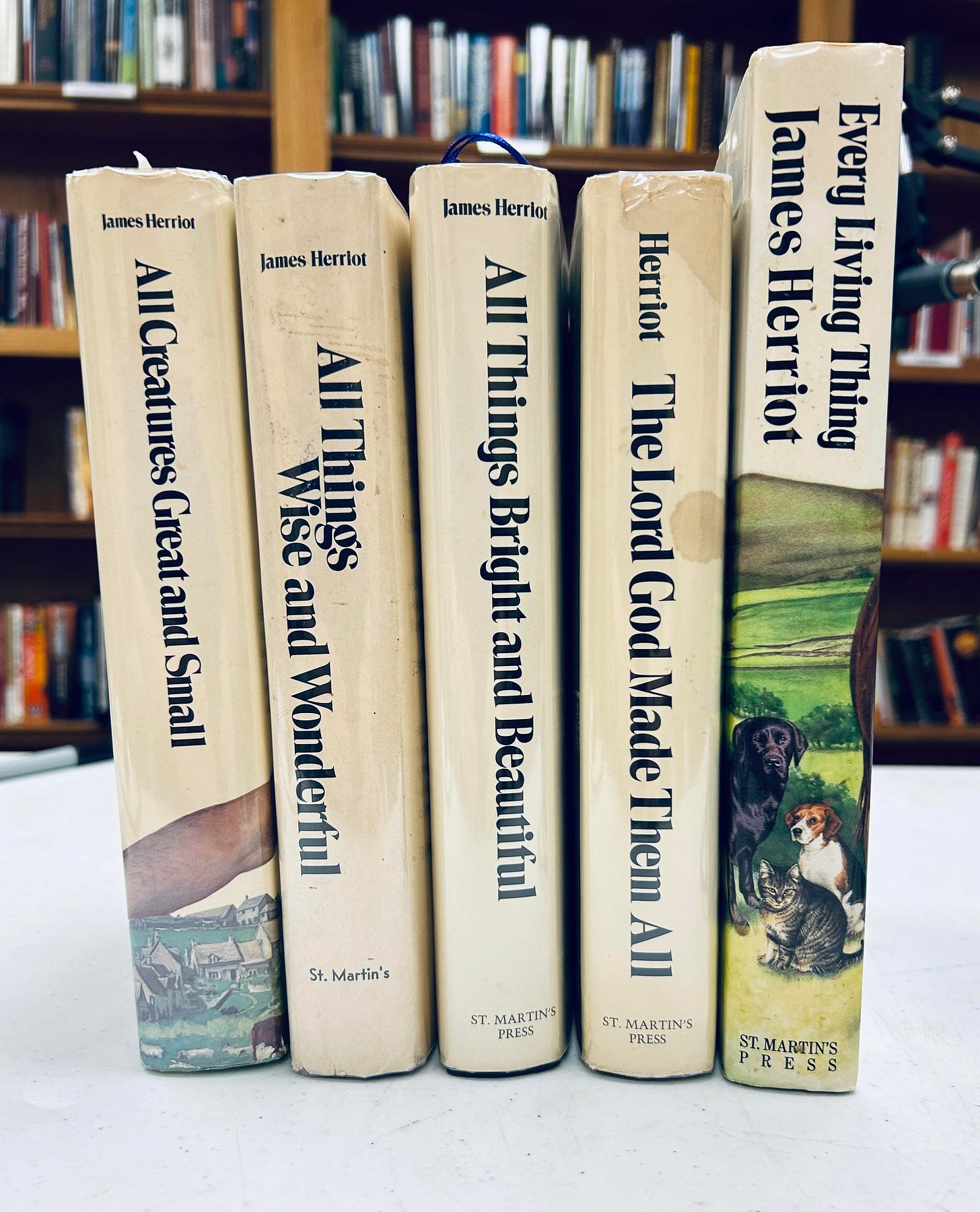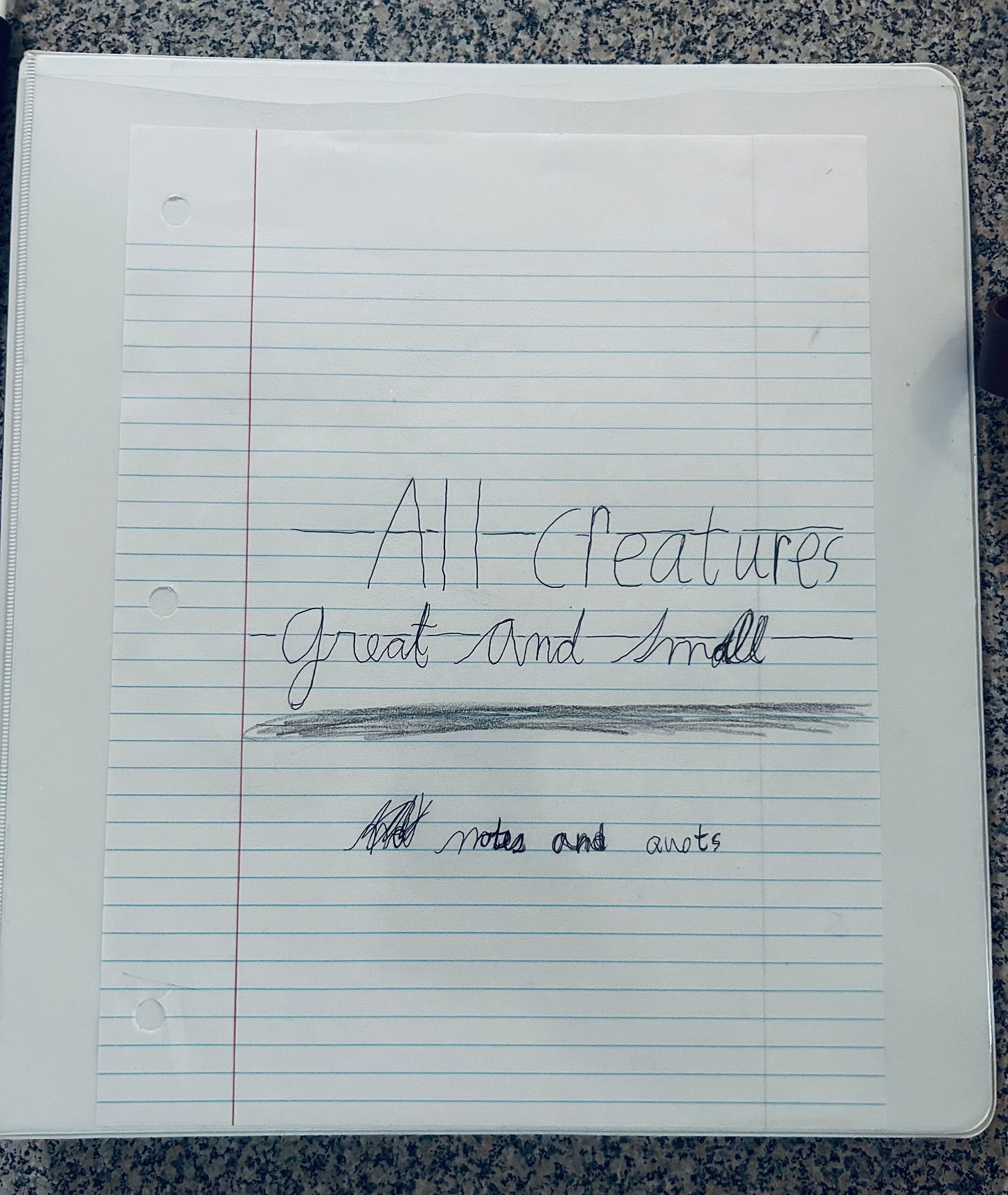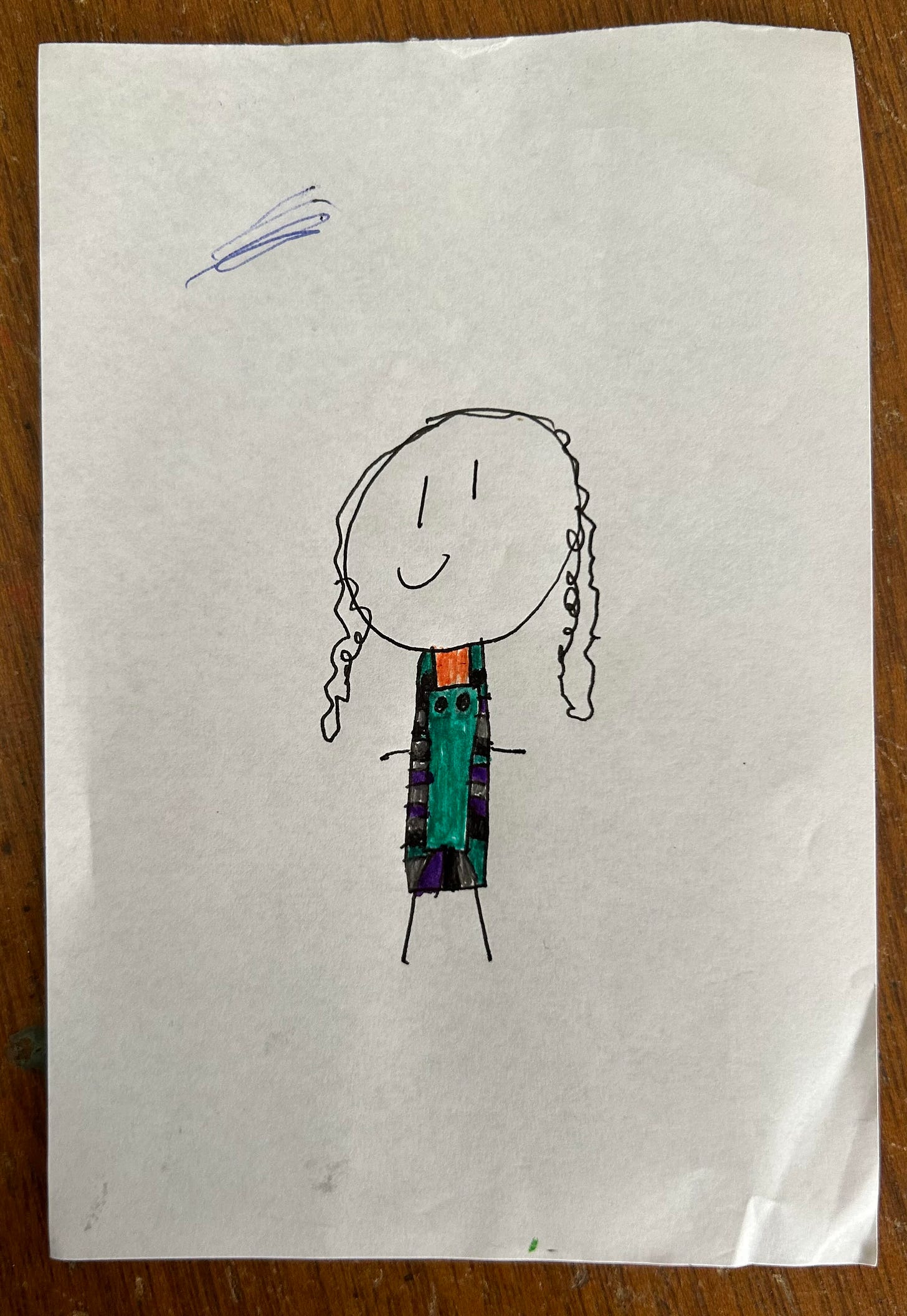In Praise of All Creatures Great & Small (the recent PBS series)
**A warning that the following post contains copious spoilers from the first four seasons of the series of the PBS Masterpiece remake of All Creatures Great & Small. If you haven’t watched the seasons and are averse to spoilers, then read no further.**
At the recommendation of some dear friends from church, my wife, our four youngest children, and I began watching the most recent PBS Masterpiece remake of James Herriot’s All Creatures Great & Small. We were instantly hooked on the show, and many lines of dialogue have become part of our family’s everyday conversation.1
My initial memories of James Herriot go back to my childhood. I remember seeing the hardcover dust jackets on my parents’ small bookcase. My parents never read them to me, nor did I see them reading the books. However, the names of the books and the animal-centric dust jackets on the St. Martin’s Press editions stuck with me. Those beloved books are now with me, resting comfortably in my library.
For anything that I am about to write to make sense, you will need to have a brief introduction to the people and places of All Creatures Great and Small.2
A Brief Show Who’s Who and Where’s Where
People
James Herriot - The show’s protagonist. Originally from Glasgow, Scotland. A newly qualified veterinary surgeon. Travels to the Yorkshire village of Darrowby at the invitation of veterinarian Siegfried Farnon. Mr. Farnon is looking to hire a new assistant.
Siegfried Farnon - A veterinary surgeon whose practice operates out of Skeldale House. Mr. Farnon is loud, explosive, eccentric, and impulsive. During his finer moments, he is also kind, loyal, understanding, and puts the welfare of animals first. On the show, Siegfried is a widower.3
Audrey Hall - Mrs. Hall is the housekeeper at Skeldale House. She undertakes a thousand different tasks at Skeldale—darning, ironing, cooking, and cleaning, and showing hospitality to the veterinary practice's patients. Mrs. Hall also feels responsible for smoothing things over between Siegfried and whomever he has offended. The person Siegfried has most likely offended would be….
Tristan Farnon - Siegfried's younger brother. Tristan came to live with Siegfried and Siegfried’s wife when their parents passed away. Tristan is fond of pints of ale, flirting with various ladies in Darrowby, and looking busy without doing any actual work. Tristan fails his veterinary exams twice, which enrages Siegfried all the more. He finally passes on his third try and leaves for service in World War II at the end of season four.
Helen (Alderson) Herriot - A farmer and the wife of James Herriot. But she didn’t start out that way. In the show's first season, she is involved with a wealthy horse racer and landowner named Hugh Hulton. Helen leaves Hugh at the altar, which begins her journey toward James.4
Richard Alderson - Father of Helen (Alderson) Herriot and Jenny Alderson. Mr. Alderson is a gruff farmer with a soft heart toward his two daughters. The grief and sorrow of his wife’s passing still weigh heavy on Mr. Alderson.
Jenny Alderson - Daughter of Richard, younger sister to Helen. Jenny is headstrong and stubborn, preferring farming life over her studies at school. It is also quite obvious early on that Jenny favors James over Hugh as Helen's suitor.
Hugh Hulton - The aforementioned wealthy horse racer and landowner left at the altar by Helen. Hugh comes from privilege and loses Helen to James, but the show refuses to paint him as a simple, vindictive, two-dimensional villain. It is stronger for that decision.5
Marjorie Pumphrey - The widowed Matriarch of Pumphrey Manor. She lives in the manor with several servants and her beloved Pekingese, Tricki Woo.
Tricki Woo - The pampered pet Pekingese of Mrs. Pumphrey. Because of indulgence and inactivity, Tricki regularly suffers from flop bott. He also goes “cracker dog” whenever he encounters a chicken. Tricki is quite fond of his “Uncle Herriot.”
Richard Carmody—Richard Carmody is a young veterinarian who arrives in season 4. He is fabulously studied and knows his craft from a cold, bookish perspective. However, his people skills are woeful.
Places
Skeldale House - The house owned by Siegfried Farnon and the hub of his veterinary practice. It is the location of most of the domestic action on the show.
The Drover’s Arms - The local pub where most of Darrowby congregates to chat and gossip over a pint.
Heston Grange - The farmland owned by Hugh Hulton. The land is farmed by the Alderson family: Richard, Helen, and Jenny.6
Pumphrey Manor - The estate owned by wealthy widow Marjorie Pumphrey.
Mallock’s - A slaughteryard where injured or diseased animals are taken to be euthanized.
I have considered why this television show has become so beloved in our home. It has captured our hearts and imaginations like no other show in our family's history. I think there are a multiplicity of reasons. Nearly every episode contains something to discuss with the children. Deep lessons about honor, duty, truth-telling, forgiveness, compassion, kindness, honorableness, and hard work. Here are a few lessons from the show that have gotten a lot of discussion in our home.
Honor
As I mentioned previously, Hugh Hulton is a wealthy landowner. One of his properties is the farm worked by Helen and her family. When Helen leaves Hugh at the altar, it would have been easy for the writers to cast Hugh as a vindictive villain who takes harsh revenge on Helen and her family for his public shaming. Instead, Hugh meets with the Aldersons and announces that he has had the deed to the farm legally amended. Mr. Alderson is now the full owner of the property and Helen and Jenny’s names are on the deed should Mr. Alderson pass away.
The cynic would see Hugh’s actions as a ploy by a brokenhearted man trying to re-win his fiancée’s heart through a good deed. But the writers never indicate that this is what Hugh is doing. He says it is “the right thing” and something he should have done long ago. As I have told my children, Hugh could have let anger and revenge eat at him to the point where he kicked Helen and her family off the land. Instead, Hugh chose the high and honorable road in giving the Alderson family the gift of land ownership.7
Duty
James takes on extra work to oversee tuberculosis testing in the Dales. He faces a crisis when one of the cows at Heston Grange tests positive for TB. Now he must tell his father-in-law that the entire herd must be quarantined and the farm shut down for one month. Mr. Alderson is frantic to find another way but James is adamant that procedures must be followed and that there is no other way. Doing one’s duty often means conflict, even conflict with one’s own family.
Kindness
Each season ends with a Christmas episode. They are all excellent, but the Christmas episode at the end of season 2 surpasses them all. Tricki Woo falls ill and struggles to recover. He is sedated on Christmas Eve in the hopes that his body can rest and recover. Recover he does—on Christmas morning, no less—and James returns the Pekinese to Pumphrey Manor. James realizes that Mrs. Pumphrey will spend Christmas alone in a huge mansion with Tricki. James convinces a cadre of people to change their plans, descend upon Pumphrey Manor, open the curtains, set up a Christmas tree, and have Christmas dinner there with Mrs. Pumphrey and Tricki. Mrs. Pumphrey tells everyone, “I shall never forget your kindness.”
Honorableness
In one episode, Siegfried is being considered for an attending vet position at the local racehorse track. Siegfried’s great love is horses, and an attending vet at a race track would make a dream side job in addition to his regular veterinary duties. Before Siegfried is offered the job, James goes on a call to see about a horse who has colic. It turns out that the horse isn’t just any horse but a horse named Andante, owned by…Hugh Hulton. And instead of mere colic, Andante is suffering from a “twisted bowel” that has caused toxins to back up into his bloodstream. The horse is dying and must be put down immediately to end its suffering. Hugh walks in just as James euthanizes Andante and is enraged about what has happened to his prize racehorse.
The horse track manager finally meets with Siegfried and tells Siegfried that the attending vet position is his, on one condition. That condition is that Siegfried must fire James because the other horse owners no longer trust “James, the horse killer.” Asked if they have a deal, Siegfried regretfully informs the horse track manager that they do not. A postmortem on Andante has proven that James handled the situation perfectly and that the euthanization of the horse, while tragic, was the humane course of action. The proper care of the animal always comes first and Siegfried is unwilling to fire James for doing the right thing. The horse track manager rescinds the offer to Siegfried and they tersely bid each other “good evening.”
Siegfried was this close to having a job that he had dreamed about. All it would have taken was for him to sack James and find another assistant. But Siegfried—for all of his bluster and cantankerous—is an honorable man. He knows that James did the proper thing under terribly difficult circumstances. He realizes that James is the finest assistant he has ever hired. Therefore, Siegfried acts honorably and forfeits his own dream of being an attending vet at a racetrack to protect James’ job and reputation.
Beauty
Everything about the show is beautiful. Beautiful, in a rustic sort of way. Beutiful in a sort of muddy, muckity muck way. But beautiful nonetheless. My hunch is that the beauty of the show is what is at work most on the imaginations of my kids.8
Every show has at least one or two panoramic shots of the Yorkshire Dales accompanied by Alexandra Harwood’s sweeping musical score. My oldest son has told me several times during such scenes, “This show is so beautiful that it makes my heart hurt.” I understand perfectly what he means.
Donegality
The final thing I will mention is the show’s “donegality.” Donegality is a neologism coined by author and C. S. Lewis scholar Michael Ward in his book Planet Narnia. Ward uses the phrase to describe a story's distinctive essence or atmosphere. He writes in Planet Narnia:
Again and again, in defending works of romance, [C. S.] Lewis argues that it is the quality or tone of the whole story that is its main attraction. The invented world of romance is conceived with this kind of qualitative richness because romancers feel the real world itself to be 'cryptic, significant, full of voices and 'the mystery of life." Lovers of romances go back and back to such stories in the same way that we go back to a fruit for its taste; to an air for ... what? for itself; to a region for its whole atmosphere—to Donegal for its Donegality and London for its Londonness. It is notoriously difficult to put these tastes into words.9
We return repeatedly to Lewis’ Narnia books because we love their Narnia-ness. If we are old enough to start reading fairy tales again, we love the Narnia-ness even more. Fans of Tolkien’s Lord of the Rings feel the same about those stories.
The locations of the All Creatures television show have a similar effect. Who wouldn’t want to live in a world with so many wonderful locations?
Conclusion
Usually I am a “the book rules, the television show/movie drools” person. All of my kids will attest to this. I am definitely not a fan of the three Narnia movies. I couldn’t even bring myself to watch the movies of Prince Caspian and The Voyage of the Dawn Treader.
However, in the case of All Creatures Great & Small, we all came to this show before reading the books. My youngest three kids and I are going back and playing catch-up, with me reading the books aloud to them. We are noting the differences between the books and the television show. In the books, Siegfried is less cruel and more absent-minded and eccentric. Mrs. Pumphry is far more fantastical in the books.10 Mrs. Hall has a far smaller role. Everyone smokes cigarettes. And Hugh Hulton simply doesn’t exist. We make note of the differences and we discuss them. We adore the books and we adore the show. There is room for both in our world. Each has its own flavor, its own Donegality. We adore both of them.
“Cush!” “Keys?!? On the ‘ook, where they live.” “Mrs. Hall, you have a tone.” “[Fill in the blank person], you have a tone,” “Carpe some Diem,” “You smell like a barmaid’s apron,” “Cometh the hour, cometh the man.”
The people and places I am describing are as the show presents them. As with all book-to-screen adaptations, they differ tremendously from the books written by James Herriot. I strongly encourage you to get copies of the books and dive right in. Your public library likely has all of them. I didn’t read the books before seeing the show, which could explain my enthusiasm for the show. If you read the books first, your sentiments about the show will probably differ.
Siegfried Farnon was a bachelor in the books. However, the “real life” person upon which Siegfried was based (Donald Sinclair) was a widower. Confused yet?
The whole story arc concerning Helen and Hugh does not appear in the books.
As far as I can tell, Hugh Hulton does not appear in any of the Herriot books. He appears to be invented as a wealthy landowner for the Aldersons and love ineterest of Helen.
Heston Grange appears in the books, but not as land owned by Hugh Hulton.
There are a few brief moments of tension later between Hugh and James during a cricket match. However, the situation is handled on the field of play and both characters shake hands honorably after the match.
And perhaps on me too.
Michael Ward, Planet Narnia: The Seven Heavens in the Imagination of C.S. Lewis (New York: Oxford Univ. Press, 2008), 16.
Tricki Woo “writes letters to Uncle Herriot” and expects those letters to be answered. And the letter must be addressed to Tricki, not to Mrs. Pumphrey.








